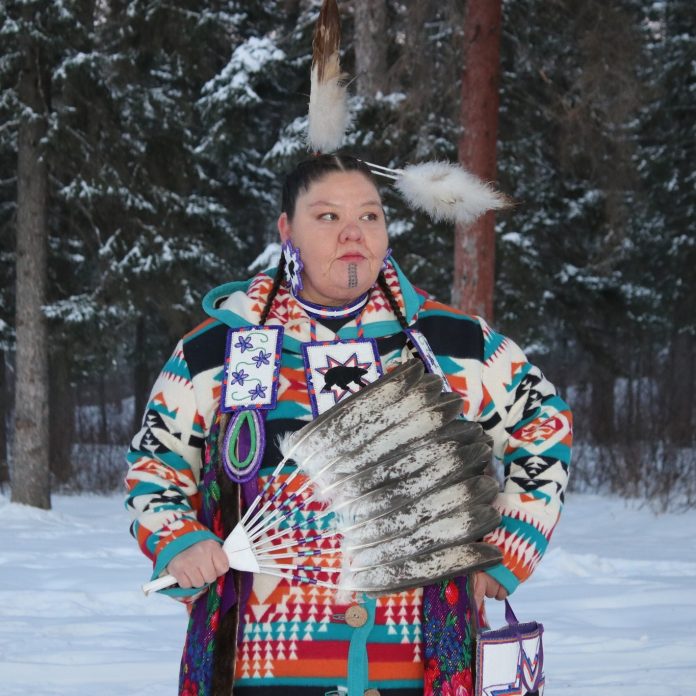
Video of Cree woman being ejected over facial tattoos garners more than 63,000 views
An Indigenous woman says she’s debating on filing a human rights complaint after she was asked to leave a Prince Albert bar for having a cultural face tattoo.
Sara Carriere-Burns met up with some family members for supper at the Prince Albert Brewing Co. (PABCO) on March 25. After giving her order of a water and Diet Coke to a waitress, a man – who identified himself as a manager – told Carriere-Burns that she needed to leave the establishment due to their policy against facial tattoos.
“I said, ‘This is more than a tattoo, it’s a part of my culture’,” said Carriere-Burns. “He’s like, ‘Sorry, I don’t know. Those are the rules.’”
Carriere-Burns asked to talk with the owner about their policy and have a chance at explaining the meaning behind her tattoo, but knew it was a lost cause once her table was approached by the owner, who immediately began speaking to her with what she described as a tone of annoyance.
“I just knew at that point there was going to be no discussing of anything,” said Carriere-Burns.
In a video posted to Carriere-Burns’ Facebook account of the interaction between herself and PABCO owner Rob McLeod, the voice she identified as McLeod can be heard stating, “our number one rule on our dress code is no facial tattoos”.
After attempting to explain that the tattoo is a part of her culture, McLeod replied, “I don’t care. Put makeup on it, cover it up, it’s not allowed in our bar. I don’t care what your culture is.” Carriere-Burns said she left after the encounter.
Her video is making rounds through social media, garnering more than 63,000 views, 800 shares and hundreds of comments since it was posted the same evening as the incident. PABCO has limited who can comment on their Facebook page since news of the situation spread, but angry and laugh reacts can be found under recent posts.
“It was really embarrassing, and it was even more embarrassing to know there would be no healthy communication,” recalled Carriere-Burns. “I couldn’t really say what was in my heart and my mind. I didn’t really have a choice in the matter.”
She went on to say that there is a lack of education about Indigenous cultural traditions not only in Prince Albert, but throughout Canada.
“It’s important because there was a time when we didn’t get to be First Nations. We didn’t get to be Indigenous. We didn’t get to have our cultural traditions and today we can,” said Carriere-Burns. “I’m absolutely proud to say that’s what brought me through my nine and a half years of sobriety, and nobody can take that from me.”
Carriere-Burns is from the James Smith Cree Nation and holds her culture close to her heart. After getting her tattoo almost a year ago, she said this is the first time she’s received any negative feedback.
“The two outer lines are for the two children that we lost during pregnancy, the two inner lines are my biological daughters, and the dots each represent kids that are not mine biologically. I’m also a foster mom,” Carriere-Burns said of her chin markings, which hold strong cultural significant in several Indigenous cultures including Cree. “I get complimented on it almost every time I leave the house.”
Carriere-Burns added that while she’s still processing everything, she’s thinking about filing a human rights complaint.
Under section 12 of The Saskatchewan Human Rights Code, 2018, businesses and service providers cannot discriminate against an individual on the basis of creed, ancestry, religion, disability, age, place of origin, or any other prohibited ground.
In an email, a spokesperson for the Saskatchewan Human Rights Commission said if an individual feels as though they’ve been denied a service regularly offered to the public, and that the denial was due to discriminatory reasons, they can reach out to the Human Rights Commission to file a complaint.
“The alleged facts surrounding a complaint are key in determining whether the Commission can formalize and investigate that complaint,” said the email. “Businesses and service providers with human rights-related related questions are encouraged to call the Commission’s Business Help Line free of charge – (306) 933-8274. The help line was created to provide advice for businesses and service providers so they can avoid making mistakes that could result in human rights complaints.”
During an interview, Carriere-Burns told the Herald that she was travelling to a traditional ceremony after talking about the incident with a friend.
“[They] said we just have to pray for them, so that’s what we’re going to go do.”
The Herald attempted to reach out to PABCO multiple times for comment but did not receive a response back in time for publication.

